高三英语月考试题及答案-海南师范大学附属中学2016届高三第九次月考
高三英语月考试题及答案-师范大学附属中学2016届高三上学期高考适应性月考(四)
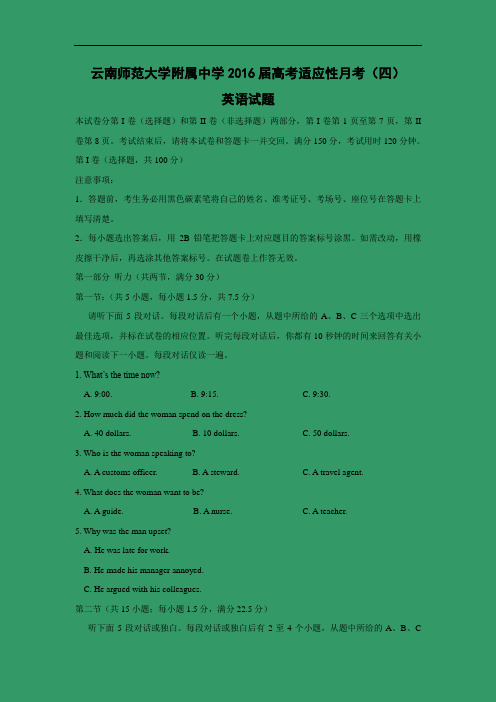
云南师范大学附属中学2016届高考适应性月考(四)英语试题本试卷分第I卷(选择题)和第II卷(非选择题)两部分,第I卷第1页至第7页,第II 卷第8页。
考试结束后,请将本试卷和答题卡一并交回。
满分150分,考试用时120分钟。
第I卷(选择题,共100分)注意事项:1.答题前,考生务必用黑色碳素笔将自己的姓名、准考证号、考场号、座位号在答题卡上填写清楚。
2.每小题选出答案后,用2B铅笔把答题卡上对应题目的答案标号涂黑。
如需改动,用橡皮擦干净后,再选涂其他答案标号。
在试题卷上作答无效。
第一部分听力(共两节,满分30分)第一节:(共5小题,每小题1.5分,共7.5分)请听下面5段对话。
每段对话后有一个小题,从题中所给的A、B、C三个选项中选出最佳选项,并标在试卷的相应位置。
听完每段对话后,你都有10秒钟的时间来回答有关小题和阅读下一小题。
每段对话仅读一遍。
1. What’s the time now?A. 9:00.B. 9:15.C. 9:30.2. How much did the woman spend on the dress?A. 40 dollars.B. 10 dollars.C. 50 dollars.3. Who is the woman speaking to?A. A customs officer.B. A steward.C. A travel agent.4. What does the woman want to be?A. A guide.B. A nurse.C. A teacher.5. Why was the man upset?A. He was late for work.B. He made his manager annoyed.C. He argued with his colleagues.第二节(共15小题;每小题1.5分,满分22.5分)听下面5段对话或独白。
2020-2021学年海南师范大学附属中学高三英语月考试题及参考答案
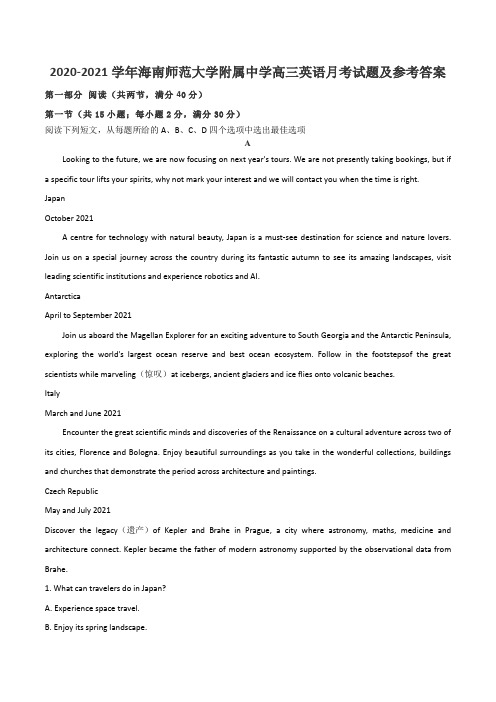
2020-2021学年海南师范大学附属中学高三英语月考试题及参考答案第一部分阅读(共两节,满分40分)第一节(共15小题;每小题2分,满分30分)阅读下列短文,从每题所给的A、B、C、D四个选项中选出最佳选项ALooking to the future, we are now focusing on next year's tours. We are not presently taking bookings, but if a specific tour lifts your spirits, why not mark your interest and we will contact you when the time is right.JapanOctober 2021A centre for technology with natural beauty, Japan is a must-see destination for science and nature lovers. Join us on a special journey across the country during its fantastic autumn to see its amazing landscapes, visit leading scientific institutions and experience robotics and AI.AntarcticaApril to September 2021Join us aboard the Magellan Explorer for an exciting adventure to South Georgia and the Antarctic Peninsula, exploring the world's largest ocean reserve and best ocean ecosystem. Follow in the footstepsof the great scientists while marveling(惊叹)at icebergs, ancient glaciers and ice flies onto volcanic beaches.ItalyMarch and June 2021Encounter the great scientific minds and discoveries of the Renaissance on a cultural adventure across two of its cities, Florence and Bologna. Enjoy beautiful surroundings as you take in the wonderful collections, buildings and churches that demonstrate the period across architecture and paintings.Czech RepublicMay and July 2021Discover the legacy(遗产)of Kepler and Brahe in Prague, a city where astronomy, maths, medicine and architecture connect. Kepler became the father of modern astronomy supported by the observational data from Brahe.1. What can travelers do in Japan?A. Experience space travel.B. Enjoy its spring landscape.C. Visit its scientific institutions .D. Learn about its traditional culture.2. Which of the following can you choose if you are free in August?A. Japan.B. Italy.C. Antarctica.D. Czech Republic .3. What do Italy and Czech Republic havein common?A. Astronomy.B. Architecture.C. Paintings.D. Medicine .BDengue is a very painful illness spread by mosquitoes. In severe cases, dengue can even be deadly. Dengue is a serious disease affecting people in around 120 countries. It can cause high fevers, headaches, and severe pain. It’s caused by a virus spread by bites from mosquitoes. Therefore, dengue is more common in warm areas. Every year, roughly 390 million people get dengue, and as many as 25,000 die from it.Now scientists seem to have found a way to protect humans from dengue by first protecting mosquitoes. Dengue fever is caused by a virus. Though it may seem strange to think of it this way, the mosquitoes that spread the dengue virus are also infected with it. But the virus doesn’t seem to hurt the mosquitoes.Wolbachia is a kind of bacteria commonly found in many insects. In some insects, Wolbachia can keep some viruses fromduplicatingthemselves, which is how viruses grow inside a body. Wolbachia isn’t naturally found in mosquitoes. But by infecting these mosquitoes with Wolbachia, scientists can keep the mosquitoes from catching the dengue virus. Even better, the young mosquitoes coming from the eggs of the infected mosquitoes also carry Wolbachia.Researchers working with the World Mosquito Program (WMP) ran a 27-month study in Yogyakarta, Indonesia. They split a 10-square-mile area up into 24 smaller areas. In half of the areas, the scientists did nothing. In the other half, they set out containers of eggs from mosquitoes that had Wolbachia. They did this every two weeks for just 4 to 6 months.Ten months later, 80% of the mosquitoes in the treated areas carried Wolbachia. The researchers report the number of dengue cases in the treated areas was reduced by 77% and that the number of people needing hospital care for dengue dropped by 86%.Because the results of the experiment were so good, the WHO has placed Wolbachia-infected mosquito eggs in all parts of Yogyakarta and surrounding areas. The WHO says that within a year, their efforts will protect 2.5million people against dengue and that their efforts will be turned into a program that can be repeated worldwide.4. What kind of disease is dengue?A. It is likely to cause death.B. It causes no pain but fevers.C. It happens less often in hot areas.D. It hurts both people and mosquitoes.5. The underlined word “duplicating” in paragraph 3 most probably means “________”.A. worsening the harm ofB. expanding the size ofC. increasing forces ofD. making copies of6. What can be inferred about the method from the figures listed in paragraph 5?A. Its wide use.B. Its effectiveness.C. Its complexity.D.Its easy operation.7. What’s the WHO’s attitude towards the method?A. Ambiguous.B. Positive.C. Tolerant.D. Skeptical.CNowadays medical technology seems to be advanced enough for doctors to perform brain transplants (移植). Though this procedure (程序) has only been successfully performed on animals so far, doctors are still hopingto perform this procedure on humans. However, in my opinion, brain transplants should not be performed at all, especially not on humans because of the large number of problems and side effects that could come along with. Hopefully these dangerous side effects will convince doctors not to perform this procedure on humans.Despite many benefits technology brings. I do not think this medical technology of brain transplants will help. We were all born with one brain and through childhood to adults our mind developed into who we are, so if with a different brain we would no longer be unique. A person with a different brain would seem to be a total stranger and in many ways they would be. No one should steal our identity from us, even if we are seriously injured, and change it to a completely new one. Also for the people who have died with healthy brains, that was their identity and it should not be given to anyone else.Another problem with brain transplants is how doctors can choose what are “healthy” or “normal” brains. An elderly person who has died would have an aged brain that would not be as efficient as younger person’s brain. Then would doctors have to find healthy brains of the same age as the person who needs it? This could also bring up other factors such as intelligence, sex, or physical problems that a person might have had before death. Also another problem might be how long a brain can be kept “alive” after death and how it can be kept “alive” without damage.Overall. my feelings about this operation are that it should not be done on humans until doctors have overcome all the problems and challenges that stand in their way of making human brain transplants successful.8. Why does the author think brain transplants should not be performed at all?A. The cost of the operation is extremely high.B. Doctors are not able to perform brain transplants.C. A good many problems and side effects may arise.D. This procedure has only been successful on animals9. What is the second paragraph mainly about?A. People shouldn’t give their healthy brains to others.B. Having a brain transplant means losing one’s identity.C. Transplanting brains is changing old brains into new ones.D. Having brain transplants indicates stealing identity from others.10. What is the writers’ attitude towards brain transplants an humans?A. indifferentB. favorableC. disapprovingD. objective11. What is the author’s purpose in writing the passage?A. To encourage brain donation.B. To stress the importance of brain operation.C. Toargue against brain transplants on humans.D. To introduce the technology of brain transplants.DRecently, I read about a promotion from a home builder in San Diego where consumers (消费者) could buy a 4,000 square foot house for $1.6 million and get a smaller home bythe developer valued at $400 thousand for free. This sounds like a fantastic deal, but I am alwayswary ofany promotion labeled (给……加标签) with“buy one get one free”, and here is why.Oftentimes, “buy one get one free” ends up being “buy two at the regularprice”. For example, I often see “buy one get one free” ads for orange juice at the supermarket, but the first box always costs over $5.00. At the same time, the juices not in the promotion are selling for $2.50 to $2.99 a box.Another problem with “buy one get one free” is that oftentimes you do not need the second item. I only consume one gallon of milk every two weeks. If I were talked into buying a second gallon in a “buy one get onefree” promotion, then the second gallon would go bad before I have time to consume it. That creates waste instead of savings.In the case of theSan Diegodeveloper, so far they have received one offer on their expensive houses, but the buyer does not want the cheaper house for free. Instead, he wants the value of the smaller home taken away from his purchase price. I think this guy is quite wise because he saw right through the marketing of “buy one get one free”.Finally, it is up to you to see how much you need and how much you are willing to spend. Knowing the regular price of things also helps you in deciding whether a “buy one get one free” promotion is truly a great deal.12. What does the underlined part “wary of” in Paragraph 1 probably mean?A. annoyed atB. careful aboutC. familiar withD. puzzled about13. Why does the author mention milk in Paragraph 3?A. To show that there are many promotions of food.B.To suggest that people think twice before they shop.C. To prove that the second item isn’t always as good as the first one.D. To show that people often buy more than they need in the promotion.14. What does the house buyer want to do?A. Buy the smaller house only.B. Get the smaller house for free.C. Buy the larger house for $1.2 million.D. Buy both the larger and smaller houses for $2 million.15. How does the author organize the text?(P: Paragraph)A. B. C. D.第二节(共5小题;每小题2分,满分10分)阅读下面短文,从短文后的选项中选出可以填入空白处的最佳选项。
高三英语9月月考试卷高三全册英语试题

领兑市安插阳光实验学校全中学高三英语9月月考试卷本试卷分第I卷(选择题)和第Ⅱ卷(非选择题)。
第I卷l至8页,第Ⅱ卷9至10页。
考试结束,将本试卷和答题卡一并交回。
注意事项:12.选出每小题答案后,用铅笔把答题卡上对题目的答案标号涂黑。
如需改动,用橡皮擦干净后,再选涂其他答案标号。
不能答在本试卷上,否则无效。
第I卷第一听力(共两节,满分30分)做题时,先将答案标在试卷上。
录音内容结束后,你将有两分钟的时间将试卷上的答案转涂到答题卡上。
第一节(共5小题;每小题1.5分,满分7.5分)听下面5段对话。
每段对话后有一个小题,从题中所给的A、B、C三个选项中选出最佳选项,并标在试卷的相位置。
听完每段对话后,你都有10秒钟的时间来回答有关小题和阅读下一小题。
每段对话仅读一遍。
例:How much is the shirt?A.£19.15.B.£9.15.C.£9.18.答案是B。
1. What can we learn from the conversation?A. John is going to give a speech.B. John won’t come to the meeting.C. The woman doubts whether John will come.2. What are the speakers discussing?A. A book by a new author.B. A book they have both read.C. A book by an author they both know.3. Which is the woman going to choose next year?A. Extra sport.B. Cooking.C. Art.4. How is the woman getting along with her piano lessons?A. She is tired of them.B. She is making progress.C. She wants to give them up.5. Why did Mr. Green knock the girl down?A. He was driving fast.B. He didn’t see the girl.C. He was drunk.第二节(共15小题:每小题1.5分,满分22.5分)请听下面5段对话。
高三英语月考试题及答案-师范大学附属中学2016届高三月考(三)
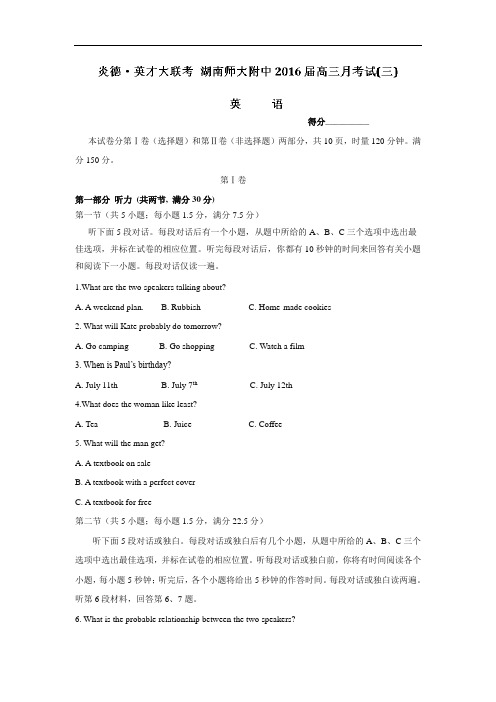
得分__________ 本试卷分第Ⅰ卷(选择题)和第Ⅱ卷(非选择题)两部分,共10页,时量120分钟。
满分150分。
第Ⅰ卷第一部分听力(共两节, 满分30分)第一节(共5小题;每小题1.5分,满分7.5分)听下面5段对话。
每段对话后有一个小题,从题中所给的A、B、C三个选项中选出最佳选项,并标在试卷的相应位置。
听完每段对话后,你都有10秒钟的时间来回答有关小题和阅读下一小题。
每段对话仅读一遍。
1.What are the two speakers talking about?A. A weekend plan.B. RubbishC. Home-made cookies2. What will Kate probably do tomorrow?A. Go campingB. Go shoppingC. Watch a film3. When is Paul’s birthday?A. July 11thB. July 7thC. July 12th4.What does the woman like least?A. TeaB. JuiceC. Coffee5. What will the man get?A. A textbook on saleB. A textbook with a perfect coverC. A textbook for free第二节(共5小题;每小题1.5分,满分22.5分)听下面5段对话或独白。
每段对话或独白后有几个小题,从题中所给的A、B、C三个选项中选出最佳选项,并标在试卷的相应位置。
听每段对话或独白前,你将有时间阅读各个小题,每小题5秒钟;听完后,各个小题将给出5秒钟的作答时间。
每段对话或独白读两遍。
听第6段材料,回答第6、7题。
6. What is the probable relationship between the two speakers?A. ColleaguesB. Husband and wifeC. Driver and passenger7. Where is the woman going first today?A. Her homeB. The WalmartC. Her grandma’s听第7段材料,回答第8、9题。
海南省海南师范大学附属中学高三第九次月考英语试题含答案
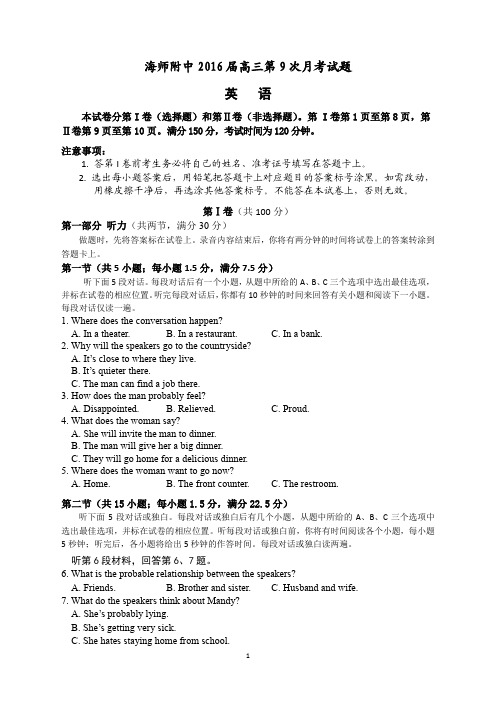
海师附中2016届高三第9次月考试题英语本试卷分第I卷(选择题)和第Ⅱ卷(非选择题)。
第 I卷第1页至第8页,第Ⅱ卷第9页至第10页。
满分150分,考试时间为120分钟。
注意事项:1. 答第I卷前考生务必将自己的姓名、准考证号填写在答题卡上。
2. 选出每小题答案后,用铅笔把答题卡上对应题目的答案标号涂黑。
如需改动,用橡皮擦干净后,再选涂其他答案标号。
不能答在本试卷上,否则无效。
第Ⅰ卷(共100分)第一部分听力(共两节,满分30分)做题时,先将答案标在试卷上。
录音内容结束后,你将有两分钟的时间将试卷上的答案转涂到答题卡上。
第一节(共5小题;每小题1.5分,满分7.5分)听下面5段对话。
每段对话后有一个小题,从题中所给的A、B、C三个选项中选出最佳选项,并标在试卷的相应位置。
听完每段对话后,你都有10秒钟的时间来回答有关小题和阅读下一小题。
每段对话仅读一遍。
1. Where does the conversation happen?A. In a theater.B. In a restaurant.C. In a bank.2. Why will the speakers go to the countryside?A. It’s close to where they live.B. It’s quieter there.C. The man can find a job there.3. How does the man probably feel?A. Disappointed.B. Relieved.C. Proud.4. What does the woman say?A. She will invite the man to dinner.B. The man will give her a big dinner.C. They will go home for a delicious dinner.5. Where does the woman want to go now?A. Home.B. The front counter.C. The restroom.第二节(共15小题;每小题1.5分,满分22.5分)听下面5段对话或独白。
海南省海南中学2016届高三第十次月考英语试题含答案

海南中学2016 届高三第10 次月考英语试卷(无听力)【阅读理解】AEarlier this week, I wrapped up(圆满完成) a 5—day trip in SanFrancisco。
I woke upa few hours before sunrise, drove through the darkness and out of the city, hiked for30 minutes to the top of a hill overlooking the Golden Gate Bridge,and snapped(拍摄)this photo. As I stood there soaking in the early morning light, I was reminded of an important lesson.When I arrived in San Francisco,I told myself,"Just take photos as you do other things.”My primary goal was to meet with friends and so I figured I could take pictures as we walked around the city. This resulted in exactly zero photos worth sharing。
I had vague ideas lik e,”I'd like to do some street photography,”but I never went out with the intent of photographing something specific。
Finally,on the last morning,I went out with the intent of capturing a specific picture and I ended up with something worth sharing。
海南省农垦中学高三第九次月考英语试题 含答案

农垦中学2016年高三第9次月考试题英语英语参考答案听力:1~5CAAAB 6~10ABCCA 11~15BCBCC 16~20AACCB阅读:21-24:BAAD25-28: DCBB 29-31: BBC 32-35: BABA36-40:EDAGC完形:41--45 DBAAD 46—50 ACBDB 51—55DCBCB 56--60 ADABD61.to become 62. sailor 63.and 64. the 65.taught66. himself 67.that 68.simply 69.married 70. working改错:During the summer holidays in the 2015, I thought I should do something meaningfullyinstead of staying at home. So I got a job at a KFC fast food restaurant and meaningfulworked there for a cleaner. I worked seven hour a day for three weeks.as hoursThe job was hard and bored and seemed endless, which made me so tired which Iboring thatnearly gave it up half way. After all, I stuck ∧it with determination. Every day Itostartoff for work early in the morning but got home late in the evening. Finally Istartedandfinished the job before the new term began.Now, I understand what labor mean. I think it is really a successful experience.means书面表达Dear Sir/Madam,I’m Li Hua. I took the flight BA793 on May8.But when I came to my home, I found a suitcase lost. I am writing to you to request you to help me find it back.My suitcase is a small blue one with a zip. There is a label on the handle with my name and address on it. It is really important for me, because all my important documents are put in it, including my ID card, passport and so on. Besides, it is what my father sent to me on my birthday.Thanks for your kind consideration and I look forward to receiving your earliest reply.Yours truly,Li Hua.录音原文Text 1M: What will you do all day in the summer, Mary?W: I'm going to work with my father at the store. In the evening, I'll read books. On weekends, I'll go to the beach with my family.Text 2W: This spring weather is perfect for playing tennis.M: Unfortunately the only time I get to enjoy it is when I'm walking to class or to the library. Text 3M: Hi, Jane. You've been to Paris, haven't you?W: Yes. As a matter of fact, I used to live in Paris before I went to London.Text 4M: Hi, Miss Green. Sorry. I failed your subject again but I really tried my best.W: No one is sure to succeed every time. Cheer up, young man. You will have more chances.M: Thank you, Miss Green. I'll try harder next time.Text 5M: How many people will be coming to the party on Saturday?W: We had to cross off fifteen names from our original list of one hundred and fifty.Text 6W: What's the matter? Your bike is in bad shape.M: ⑥It was hit by a car yesterday.W: Oh, were you hurt?M: Not in the least, because I wasn't riding on it. The bike was in front of my house. Both wheels were damaged. They're being repaired now.W: It was lucky that you were all right.M: ⑦But my weekend was wasted.Text 7W: Which season do you like best?M: I like spring best. It is neither too cold nor too hot.⑧Freezing days make me lazy and stuffy days make me lazier. How about you?W: ⑨I prefer summer, especially the summer evenings. When the sun comes down, it is so nice to take a walk and breathe. After a rain shower, the smell of the air is refreshing. It is also a good reason for ice cream.M: How do you get through the stuffy daytime?W: ⑩Well, I have to hide in the air-conditioned rooms. Anyway, it is all worth it. Just think about the cool evening time.Text 8M: Who's that?W: Oh, that's Hans Schmidt. He's from Berlin, Germany.(11)He's been in the United States for about four months. He arrived in Dallas on Sunday. He will fly to France next month.M: Does he speak English?W: Yes. He speaks it very well. He's studied English since the fifth grade.M: Is he married?W: Yes. His wife is in Germany.(12)They've been married since 2012.And they have a son.M: What's his hobby?W: Hans plays in a band in Germany. He's a very good musician. In fact, he's studied music since 2004, and he's played the saxophone for 10 years.M: Does he have any other interests or hobbies?W: (13)No. He used to play soccer in high school, but he doesn't play now.Text 9W: What's the worst place you've ever stayed in?M: The worst place I've ever stayed in? Well, it was a couple of years ago.(14)The hotel was recommended in a guide book and we just took the room without checking it online. Anyway, (15)the hotel looked really quite nice—the reception and everything, and it was quite cheap. W: So what was wrong with it then?M: Well, to begin with, when we went to bed, the bed was awful. And the other thing was the bathroom. The smell was awful, and it just got worse and worse as the night went on. And we nearly couldn't breathe. We didn't sleep for nearly the whole night.W: Couldn't you have opened the windows?M: Well, we tried but(16) we were on quite a busy road, you see, so the traffic noise was going day and night. Anyway, the following morning we decided to leave.W: In that case, you could ask for your money back or ask for a discount, I suppose. Did you complain or anything?M: Yes. I wrote a letter to the manager, (17)and they offered us a free extra night.Text 10M: Hi and welcome to UP for It, the radio program for people with a taste for travel and adventure. First up this week—our competition.(18)Blue Yonder Travel Company is offering two lucky people the chance of an all-expense-paid journey across Europe. The winners will travel the whole journey over land or water: that means by train, bus, ship, and even on horseback. But no planes!Now, how to enter the competition. We want you to write a story entitled Holiday Adventure, and it must be about a difficult but entertaining journey anywhere in the world. Your story can be fiction or non-fiction, so (19)don't worry if you've never traveled any further than the next town: you can use your imagination. Your story should be between 800 and 1,000 words long. And it must be all your own work. That's very important.(20)The closing date for entries is October 15th.We will announce the results at the end of November!Please write your full name and address on the back of each page of your story, and send it to Up For It, radio Nova, 33-41 Saxon Court, London EC2 4AW.。
高三英语月考试题及答案-师范大学附属中学2016届高三上学期高考适应性月考(三)
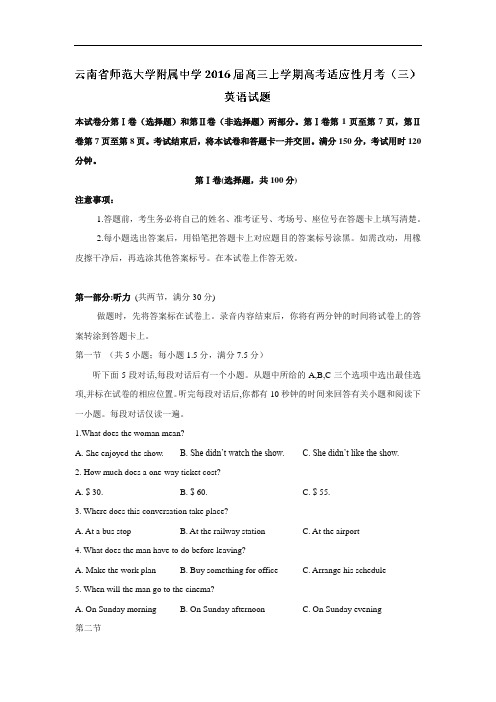
本试卷分第Ⅰ卷(选择题)和第Ⅱ卷(非选择题)两部分。
第Ⅰ卷第1页至第7页,第Ⅱ卷第7页至第8页。
考试结束后,将本试卷和答题卡一并交回。
满分150分,考试用时120分钟。
第Ⅰ卷(选择题,共100分)注意事项:1.答题前,考生务必将自己的姓名、准考证号、考场号、座位号在答题卡上填写清楚。
2.每小题选出答案后,用铅笔把答题卡上对应题目的答案标号涂黑。
如需改动,用橡皮擦干净后,再选涂其他答案标号。
在本试卷上作答无效。
第一部分:听力(共两节,满分30分)做题时,先将答案标在试卷上。
录音内容结束后,你将有两分钟的时间将试卷上的答案转涂到答题卡上。
第一节(共5小题;每小题1.5分,满分7.5分)听下面5段对话,每段对话后有一个小题。
从题中所给的A,B,C三个选项中选出最佳选项,并标在试卷的相应位置。
听完每段对话后,你都有10秒钟的时间来回答有关小题和阅读下一小题。
每段对话仅读一遍。
1.What does the woman mean?A. She enjoyed the show.B. She didn’t watch the show.C. She didn’t like the show.2. How much does a one-way ticket cost?A. $ 30.B. $ 60.C. $ 55.3. Where does this conversation take place?A. At a bus stopB. At the railway stationC. At the airport4. What does the man have to do before leaving?A. Make the work planB. Buy something for officeC. Arrange his schedule5. When will the man go to the cinema?A. On Sunday morningB. On Sunday afternoonC. On Sunday evening第二节听下面5段对话或独白,每段对话或独白后有几个小题,从题中所给的A、B、C三个选项中选出最佳选项,并标在试卷的相应位置。
- 1、下载文档前请自行甄别文档内容的完整性,平台不提供额外的编辑、内容补充、找答案等附加服务。
- 2、"仅部分预览"的文档,不可在线预览部分如存在完整性等问题,可反馈申请退款(可完整预览的文档不适用该条件!)。
- 3、如文档侵犯您的权益,请联系客服反馈,我们会尽快为您处理(人工客服工作时间:9:00-18:30)。
本试卷分第I卷(选择题)和第Ⅱ卷(非选择题)。
第I卷第1页至第8页,第Ⅱ卷第9页至第10页。
满分150分,考试时间为120分钟。
注意事项:1. 答第I卷前考生务必将自己的姓名、准考证号填写在答题卡上2. 选出每小题答案后,用铅笔把答题卡上对应题目的答案标号涂黑。
如需改动,用橡皮擦干净后,再选涂其他答案标号。
不能答在本试卷上,否则无效。
第Ⅰ卷(共100分)第一部分听力(共两节,满分30分)做题时,先将答案标在试卷上。
录音内容结束后,你将有两分钟的时间将试卷上的答案转涂到答题卡上。
第一节(共5小题;每小题1.5分,满分7.5分)听下面5段对话。
每段对话后有一个小题,从题中所给的A、B、C三个选项中选出最佳选项,并标在试卷的相应位置。
听完每段对话后,你都有10秒钟的时间来回答有关小题和阅读下一小题。
每段对话仅读一遍。
1. Where does the conversation happen?A. In a theater.B. In a restaurant.C. In a bank.2. Why will the speakers go to the countryside?A. It’s close to where they live.B. It’s quieter there.C. The man can find a job there.3. How does the man probably feel?A. Disappointed.B. Relieved.C. Proud.4. What does the woman say?A. She will invite the man to dinner.B. The man will give her a big dinner.C. They will go home for a delicious dinner.5. Where does the woman want to go now?A. Home.B. The front counter.C. The restroom.第二节(共15小题;每小题1.5分,满分22.5分)听下面5段对话或独白。
每段对话或独白后有几个小题,从题中所给的A、B、C三个选项中选出最佳选项,并标在试卷的相应位置。
听每段对话或独白前,你将有时间阅读各个小题,每小题5秒钟;听完后,各小题将给出5秒钟的作答时间。
每段对话或独白读两遍。
听第6段材料,回答第6、7题。
6. What is the probable relationship between the speakers?A. Friends.B. Brother and sister.C. Husband and wife.7. What do the speakers think about Mandy?A. She’s probably lying.B. She’s getting very sick.C. She hates staying home from school.听第7段材料,回答第8至10题。
8. Why is the man at the university?A. He’s taking classes.B. He just graduated.C. He’s checking it out.9. Why did the man probably get the scholarship?A. His grades are so high.B. He is good at baseball.C. The college wants him to play on its sports team.10. What happened when the woman went to a game last time?A. She was hit by a ball.B. She fell down and hurt herself.C. A basketball player was sent to hospital.听第8段材料,回答第11至13题。
11. Where are the speakers?A. At home.B. On the plane.C. In a movie theater.12. Why doesn’t the woman want to watch the movie?A. She’s seen it already.B. She doesn’t like the actor.C. She’s too afraid.13. What happens in this part of the movie?A. A man drives to someone’s home.B. The bad guy kills someone.C. Someone kills the bad guy at his home.听第9段材料,回答第14至17题。
14. What are the speakers doing?A. Eating dinner.B. Making breakfast.C. Setting the table for lunch.15. What does the man say about the tomatoes?A. They were bought from a store.B. They taste better than cheese.C. They were planted in their garden.16. What made the man try to eat less meat?A. He has many vegetarian friends.B. Some hunting scenes made him feel bad.C. Meat is more expensive.17. How does the woman feel about not eating meat?A. She hates the idea.B. She wouldn’t mind it so much.C. She’d rather have tomatoes, anyway.听第10段材料,回答第18至20题。
18. When was Yosemite Valley covered in ice?A. Pretty recently.B. Hundreds of years ago.C. Millions of years ago.19. Who was John Muir?A. A native American.B. An explorer.C. A rich artist.20. What can we learn about Yosemite?A. It is the oldest national park in the U.S.B. It snows there in winter.C. Cars are not allowed in the park.第二部分阅读理解(共两节,满分40分)第一节(共15小题;每小题2分,满分30分)阅读下列短文,从每题所给的四个选项(A、B、C、D)中,选出最佳选项,并在答题卡上将该项涂黑。
AMost painters discover a style of painting that is fit for them and stick to that, especially ifpeople admire their pictures. But Picasso, the great Spanish painter, was like a man who had not yet found his own particular style of painting. He kept on struggling to find the perfect expression till his death in 1973.Some of Picasso's paintings are rich, soft colored and beautiful. Others are ugly, cruel and strange. But such paintings allow us to imagine things for ourselves. They force us to say to ourselves, “What does he see that makes him paint like that?” And we begin to look under the surface of the things we see.Picasso painted thousands of pictures in different styles. Sometimes he painted the natural look of things. Sometimes he seemed to break them apart and throw the pieces in our faces. He showed us what the mind knows as well as what the eyes see. At the age of 90, he remained as curious about the world as he had been when he was young. That is why people have called him “the youngest painter in the world.”21. The ugly, cruel and strange paintings by Picasso _______.A. force us to question anything we seeB. allow us to ask questions about themC. make us try to notice something latent (隐藏) in the thingsD. cause us to think what Picasso saw was different from what we see22. T he sentence “Sometimes he seemed to break them apart and throw the pieces in our faces” means _____.A. sometimes he tore his pictures into piecesB. things in some of his pictures seem to be in disorderC. sometimes he showed some broken pictures to othersD. he broke something he was painting and threw them away23. Why have people called Picasso “the youngest painter in the world” ?A. Because he observed things with the eye and the mind.B. Because he looked young when he was old.C. Because he never stopped painting when he was old.D. Because he never gave up looking for something new.BHomestay UK/Great BritainHere you will find a selection of homestay hosts and host families in the UK. If you want to learn more about the British host family of your choice, please click on information at www. Homestaybooking. Com. You will then see a personal introduction of the UK homestay host. If you don’t want to search yourself, just register for free and receive our matching recommendations.Chika and Tara from London, the United KingdomInformation about the homestay hostChika is 28 years old. She is away from home most of the time. Tara is 18 years old. She is at home every day. They both speak English.Chika and Tara’s guests can stay for at least 5 nights and up to a maximum of 365 nights. Chika and Tara have no children living at home. It is a non-smoking residence(住宅). No pets live in this household.Information about the homestay accommodationThe accommodation is in London. The name of the neighborhood is Greenwich. The distance to the city center is 1.6km. The next access point to public transport is at 15 m distance.Three guests can stay in Tara and Chika’s house at the same time. The follow ing accommodation is generally available:Single room with shared use of the family bathroom*Size: 12.0 ㎡*Facilities: desk, Internet access, mirror, hairdryer and wardrobe(衣橱)*Price per night per person: £20.00 per night(one single)Twin room with shared use of the family bathroom*Size: 15.0 ㎡*Facilities: TV, desk, Internet access, mirror, hairdryer and wardrobe*Price per night per person:£20.00 per night(one guest)£17.00 per night(two guests)The room charge includes the following services: Internet access, regular room cleaning, breakfast, free use of the washing machine.Additional available service at an extra charge: Pick-up service(£60.00 one-way);Lunch(£6.00 per person per day); Dinner(£6.00 per person per night)Vegetarian(素食的) meals are available.24. Chika and Tara’s house would be a good choice for _______.A. a pet loverB. a person who eats no meatC. a heavy smokerD. one who needs a one-night stay25. What do we know about Chika and Tara’s house?A. It lies in the center of the city.B. Public transport is convenient there.C. It is not far away from Greenwich.D. The distance from the house to London is 1.6 km.26. If Mary chooses a twin room and pick-up service(two-way), how much should she pay per day?A. £77.B. £137.C. £80.D. £140.CHave you ever noticed that the more you have the more you want? Let’s face it. Thinking our life is good enough doesn’t come naturally to many people. When we h ave high expectations of everything in life we will run into disappointment. Only when we are aware that needs are different from desires can we live with satisfaction. Here are a few ideas to help you be happier with what you have and who you are.Focus on what you are thankful for. Most people want things to be better than they are, or when things are going well, we forget to appreciate what we have. Learn to reflect on how much better things are than they could be. Focus on what you are thankful for. Write down 5 things you are grateful for right now.When we hold onto regrets from decisions we have made, it can really poison our well-being. Many people regret something they can no longer change, which ends up holding them back from moving forward in a more positive manner. What happened in the past is done and gone, so work to stay present and be mindful of the current moment to find more joy and fulfillment.When we use other people as the measuring stick for our personal success and quality of lifewe are likely to be less satisfied. Social comparisons can provide useful information when we try to learn from others, but they also hold our perspective in a discontented position. Compare yourself less with others so you can be satisfied more.When you are focused on your big ambitions and future goals you might elide the daily pleasures that surround you. Learn to slow down and absorb the wonder and beauty around you. Stay present and focus on the task you’re undertaking at the moment. Don’t let the lif e pass you by because you’re always on the go and distracted by ambition.Practice looking at life through the lens of contentment and it will become more natural.27. How can we live with contentment?A. To change our lifestyle.B. To have a motivation in life.C. To give less attention to what we are grateful for.D. To realize the difference between needs and desires.28. What’s the main idea of Paragraph 3?A. Let go of regrets.B. Make wise decisions.C. Remember the past.D. Know the present situation.29. The underlined word “elide”(in Paragraph 5) probably means “__”.A. enjoyB. neglectC. changeD. create30. What should you do to put yourself in a good mood?A. Learn from successful people.B. Focus on your future goals.C. Make time for simple pleasures.D. Create chance to learn more.DWhy do human beings still risk their lives under ground and doing one of the dirtiest and most dangerous jobs in the world? It is an increasingly urgent question, given the recent mining accidents in Sago, W. Va and Huntington, Utah. A small group of engineers and robotics experts look forward to a day in the not-too-distant future when robots and other technology do most of the dangerous mining work.Robotic technology, in particular, holds much promise, McAteer says, especially when it comes tomapping mines and rescuing trapped miners --- the special operations of the mining industry.One of the first mining robots was developed five years ago at Carnegie Me llon University’s Robotics Institute. It was called Groundhog. It used lasers(激光器) to “see” in dark tunnels and map abandoned mines—some of the most dangerous work in the business.The latest design is called Cave Crawler. It’s a bit smaller than Groundho g,and even more advanced. It can take photos and videos and has more sensors that can detect the presence of dangerous gases. Incredibly, the robot has a real sense of logic. If it comes across an obstacle it gets momentarily confused. It has to think about what to do and where to go next. Sometimes it throws a fit just like a real person.The greatest problem, though, is cost. The money of the earliest research project was provided by the government, but that money had dried up, and it’s not clear where fu ture money will come from. Partly for that reason, and partly because of advances in safety, mining is not nearly as dangerous as it was in the past. Since 1990, fatalities(致命性) have declined by 67% and injuries by 51% , according to the National Mining Association.Some experts predict that robots in mines will serve much of the same function that they do in the automotive industry. The robots do the most boring and dangerous jobs, but won’t get rid of the need for human workers.31. The latest robot is more advanced than Groundhog, mainly because ____.A. it can map abandoned minesB. it can see in the dark tunnelsC. it has a real sense of logicD. it’s smaller than Groundhog32. The underlined phrase “throws a fit” in paragraph 4 probably means“______”A. gets sickB. becomes hungryC. gets angryD. becomes cheerful33. We can infer from the last paragraph that _____ .A. the mine robots will have a very bright futureB. robots in mines will serve much in the automotive industryC. there will be no need for human workers in minesD. robots in mines only do some simple jobs now34. We can infer from the text that ______.A. robots cannot do dangerous work in dark areasB. the mining robots do most of the mining work at presentC. groundhog can discover the presence of dangerous gasesD. experts are trying to make robots help miners with dangerous work35. What can be the best title for the text?A. Robots in MinesB. Mining Accidents in AmericaC. Cave Crawler, the Latest RobotD. The Future of Robots第二节(共5小题;每小题2分,满分10分)根据短文内容,从短文后的选项中选出能填入空白处的最佳选项,选项中有两项为多余选项。
